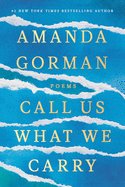
Poet Amanda Gorman (Change Sings) captured the attention of the nation when in January she became the youngest inaugural poet in history. In her lyrical, piercingly honest collection of more than 70 poems, Call Us What We Carry, Gorman offers insights about life during the "overcrowded solitude" of the Covid-19 pandemic, the ongoing racial reckoning in the U.S. and the challenges--fraught yet beautiful--of being human.
Gorman is concerned with narrative and memory, wondering, "How can we possibly begin the story of what has happened to us?" and admitting, "The hardest part of grief/ Is giving it a name." She reflects on masks, isolation, fear and grief, using a variety of formats--blank verse, brief rhyming pieces, even erasure poems--to make space for tragedies old and new. She does not mince words about the country's treatment of Black people: "Whoever said we never die/ In our dreams obviously/ Has never been Black." She touches on slave ships, racial profiling, police brutality and the weight of being constantly othered as a Black person.
Over and over again, Gorman insists that the only answers to humanity's problems are found in true community: "Like a page, we are only legible/ When opened to one another." As in her inaugural poem, "The Hill We Climb" (included in this collection), Gorman turns consistently toward light and hope: "On this meaningful morn, we mourn & we mend./ Like light, we can't be broken, even when we bend." At once heartbreaking and deeply healing, Gorman's collection calls readers to their best selves, even--or especially--in the face of great loss. --Katie Noah Gibson, blogger at Cakes, Tea and Dreams

